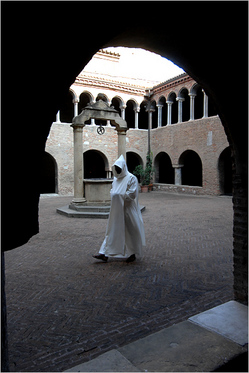 A Spiegel Online article of January 25, 2007 looks into the monastic life from the German perspective: fewer monks and nuns professing vows and more lay people for a way to make sesne of their lives. The experience of the monks and nuns in Europe, in this case Germany, is not unlike the experience one can have in monasteries in the USA when it comes to diminishing numbers, lack of vision and hope for the future, and with plentiful examples of liturgical & theological dissent. One can’t forget that so many of the ’68ers are still in charge.
A Spiegel Online article of January 25, 2007 looks into the monastic life from the German perspective: fewer monks and nuns professing vows and more lay people for a way to make sesne of their lives. The experience of the monks and nuns in Europe, in this case Germany, is not unlike the experience one can have in monasteries in the USA when it comes to diminishing numbers, lack of vision and hope for the future, and with plentiful examples of liturgical & theological dissent. One can’t forget that so many of the ’68ers are still in charge.
But not all is bunk as there are a number of indicators pointing out that people are considering the monastic life anew. In fact, there are bright, generous and fun men and women entering the monasteries: they are on fire with the reality of serving and loving the Lord and His Church; they are ready to spend themselves for the eternal good of others and they are willing to preach Jesus Christ as the one and only Savior for humanity. That doesn’t mean that thousands of men and women are running to cloister but those are very willing to take up the sacrifice of the cloister seriously. In accepting Christ one is never disappointed or easily thrown under the bus.
BUT there are equally bright, generous and loving people whose vocation is not to enter the monastery but it is to follow Christ more deeply in following a rule of life –like the Rule of Saint Benedict– while living in the world. The oblate life (also referred to as a third order or even in a secular institute) is beautiful and flourishing today.
I’ve had this article in my file for a while but some interesting points are worth considering even now. Monastic life in the 3rd millennium.
>>>One can’t forget that so many of the ’68ers are >>>still in charge.
Who are the 68ers and what did they do? I am very curious.
There are many in the world that are not of the world. We are the forgotten ones. The ones that have no higher education but have worked hard all our lives. We know that God loves us. We also know that we are not accepted in the world.
And knowing this, we are very happy. Happy to know that this is a suffering that we can offer as a sacrifice. We also know that whatever we may own now, it can be taken away in an instant.
Knowing this is a happy thought also. One more step to becoming completely free. Free to love God with our whole soul, heart and mind.
By “68ers” is meant those who had their philosphical, political and theological education in the 1960s and continue to live in that frame of reference today.
Is that the term “68’s” something in use among the Jesuits? Or where is it used? I myself am very fond of the 60’s and have great admiration for the ideals of the 60’s (the good ones). Bear in mind that I only entered high school in 1969!
As you know, 1968 was a watershed year for the social movements of the 1960’s.